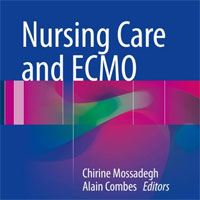Extubation in the Operating Room After Elective On-pump CABG Surgery
Although immediate extubation in the operating room following on-pump coronary artery bypass graft (CABG) surgery did not show significant differences in ICU or hospital length of stay (LOS), mortality, or ICU readmission... read more
Cytomegalovirus Infection Adverse Impact on ICU Outcomes in COVID-19 Patients
In critically ill patients with SARS-CoV-2 pneumonia, cytomegalovirus (CMV) infection was frequently observed, and associated with increased ICU and hospital mortality. CMV co-infection correlated with a higher incidence... read more
NIV Effectiveness in Critical Patients with ARF and Do Not Intubate Order
The prevalence of do-not-intubate (DNI) order was frequent in patients with acute respiratory failure (ARF) admitted to the ICU, being related to age, comorbidity, frailty and the underlying disease. non-invasive ventilation... read more
Nebulized Furosemide Effect on the Mortality of Mechanically Ventilated ARDS Adult Patients
This RCT tackles an important topic in critical care medicine, which involves a large number of critically ill patients and continues to harbor high mortality despite improvements in management. The results of the study... read more
Reducing Mortality in Critically Ill Patients
This book describes the techniques, strategies, and drugs that have been demonstrated by multicenter randomized trials to influence survival in critically ill patients, defined as those who have acute failure of at least... read more

Prophylactic NIV Effects on Weaning
The use of prophylactic non-invasive ventilation (NIV) reduced reintubation rates, ICU and hospital length of stay (LOS), and mortality. These findings support the recommendation for its use in daily practice. Rescue... read more
The Association Between Pain, Analgesia, and Delirium in Critically Ill Adults
We observed an association between pain and incident delirium among critically ill adults. Exposure to morphine or fentanyl (but no other pain medications) was associated with increased risk of delirium occurrence. From... read more
Using AI to Detect and Treat Delirium
The prevention of delirium in ICU represents a major unmet need because of its high prevalence, under-diagnosis, and independent association with adverse outcomes including higher mortality and accelerated cognitive decline.... read more
Nursing Care and ECMO
This highly informative book provides essential insights for ICU nurses at ECMO centers around the world, who face the substantial challenges involved in the management of ECMO patients. Above all, it meets their training... read more

Bundle of Care Effectiveness on Tolerance of Awake-prone Positioning in ARF Patients
In the evaluated population of patients with COVID-19-related ARF, implementing a bundle-of-care strategy was associated with a longer AW-PP exposure and a reduced risk of endotracheal intubation. In this secondary analysis... read more
Adult Critical Care Medicine
This clinical casebook provides a comprehensive yet concise state-of-the-art review of adult critical care medicine. Presented in a case-based format, each case focuses on a scenario commonly encountered with an adult patient... read more

Major Cardiovascular Surgery-induced Metabolic Reprogramming Role in AKI
Major cardiovascular surgery, particularly with cardiopulmonary bypass (CPB), induces significant changes in protein metabolism. Patients developing postoperative acute kidney injury (AKI) exhibited specific metabolic signatures.... read more
Ventilation Practices in ABI Patients and Association with Outcomes
Current mechanical ventilation practices for patients with acute brain injury (ABI) are poorly defined. This study aimed to describe ventilator settings/parameters used in intensive care units (ICUs) and evaluate their association... read more
Cardiovascular Complications of COVID-19: Acute and Long-Term Impacts
This book is the first comprehensive approach on COVID-19 cardiac complications, both during the acute phase as well as in the long-COVID period. It provides an up-to-date and highly illustrated summary of the biology... read more

Standard vs. Double Dosing of Beta-lactam Antibiotics in Critically Ill Sepsis Patients
The BULLSEYE trial is a randomized controlled study designed to enhance the treatment of critically ill patients with septic shock. The concept of administering higher and double doses of beta-lactams in such patients... read more
PCR and Biomarker Algorithms to Guide Antibiotics in Lower Respiratory Tract Infections
Acute chest syndrome (ACS) in sickle cell disease (SCD) is life-threatening and characterised by a new infiltrate on imaging plus fever or respiratory symptoms.1 Causes of ACS include infections, venous or fat embolisms or... read more
Unsupervised Multi-modal ML Approach for Robust CPR Signal Denoising
The significance of denoising biomedical signals, particularly in crucial life-saving interventions like cardiopulmonary resuscitation (CPR), cannot be overstated, as the accuracy and reliability of CPR data can be a matter... read more
Systemic Corticosteroids for Inflammatory Disorders in Pediatrics
This comprehensive volume provides current state of the art of the use of corticosteroids in the pediatric patient. It consists of 14 chapters written by leading authors from different countries. The first chapters cover... read more

NHF Oxygen During Apnoea on Hypoxemia and Intubation Success in Pediatric Emergency and ICU
The use of nasal high-flow (NHF) during emergency intubation in children did not result in a reduction in hypoxemic events or an increase in the frequency of successful intubation on the first attempt. However, in the... read more
Blood Glucose and Clinical Outcomes After ECC
Postoperative blood glucose levels significantly impact outcomes in cardiac surgery patients undergoing extracorporeal circulation (ECC) auxiliary to open heart surgery. The study's primary outcome was the 90-day mortality,... read more
Respiratory Monitoring in Mechanical Ventilation: Techniques and Applications
This book covers the up-to-date advancement of respiratory monitoring in ventilation support as well as detecting the physiological responses to therapeutic interventions to avoid complications. Mechanical ventilation nowadays... read more

Helmet CPAP as NIV for COVID-19 Patients
The COVID-19 pandemic has challenged healthcare systems globally, highlighting the need for effective respiratory support strategies. Helmet continuous positive airway pressure (CPAP) has emerged as a potential noninvasive... read more









